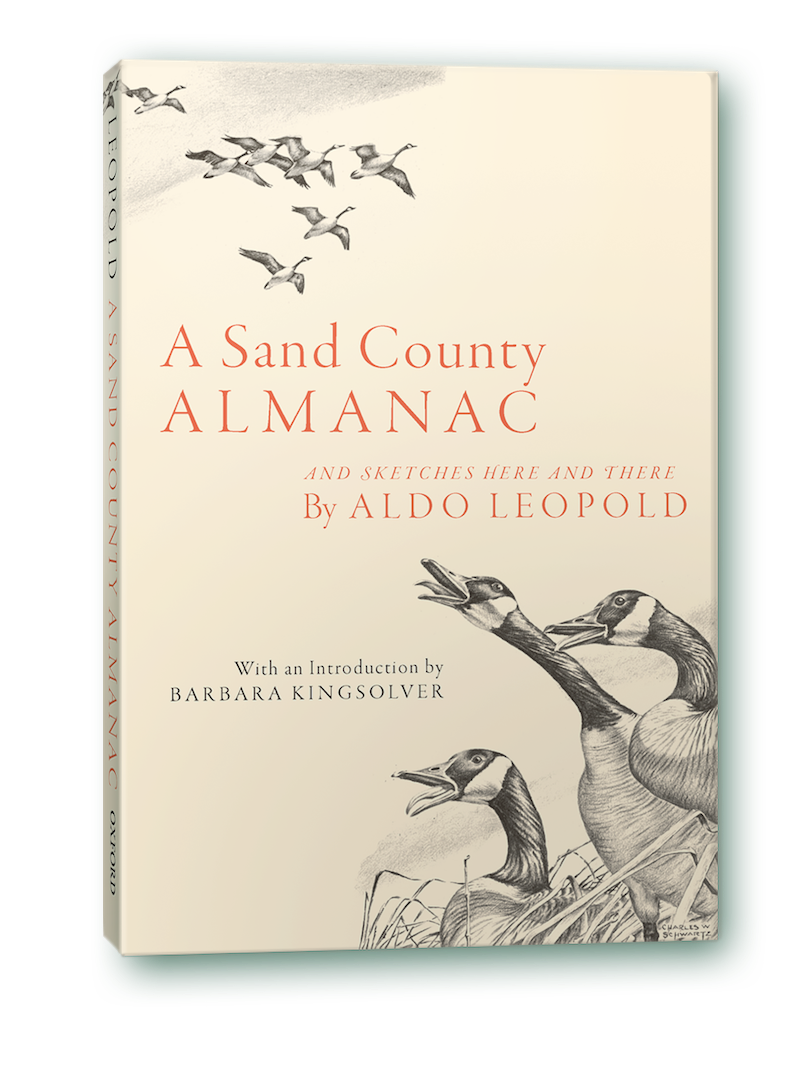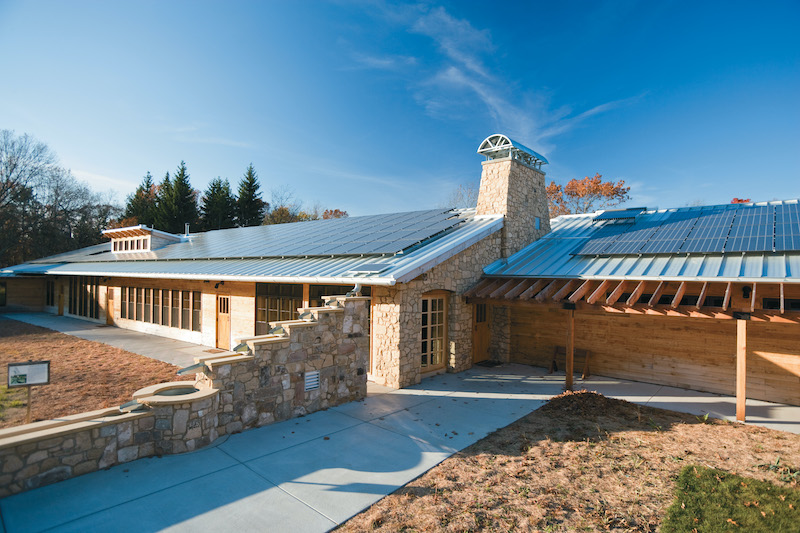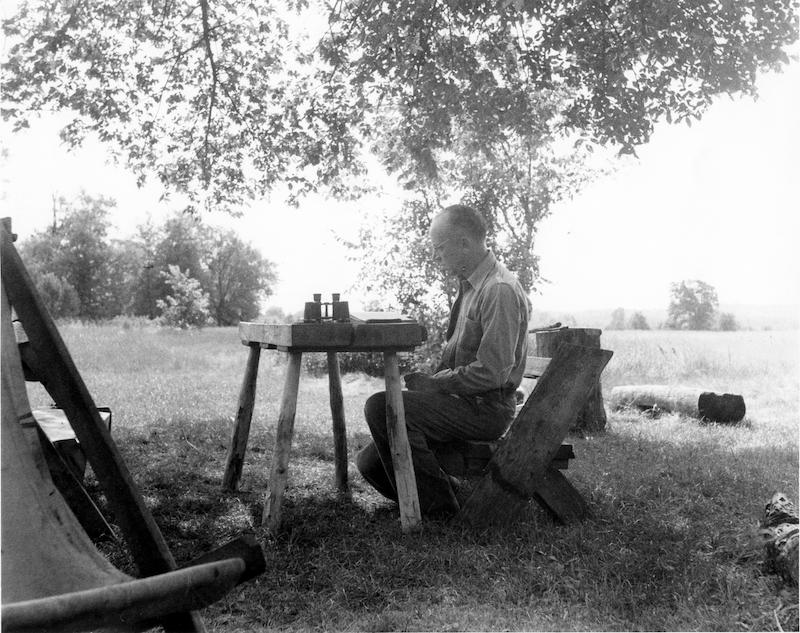Appleton, Wis. – March 3, 2021 – At The Boldt Company, every new employee is invited to read Aldo Leopold’s A Sand County Almanac and participate in a one-on-one discussion with CEO Tom Boldt as part of the onboarding process. Leopold’s book is widely regarded as one of the most influential texts on environmentalism and conservation, based on his years of stewardship on land in rural Wisconsin. On the surface, the book is a guidepost for sustainability and environmental responsibility, but a deeper dive shows Leopold’s lessons apply to today’s business culture.
“The book is all about values,” said Buddy Huffaker, Executive Director of the Aldo Leopold Foundation. “It’s draped in nature, but it’s asking us to stop and think about what is meaningful, where do we get all of our health and wealth from whether you’re in conservation or building a building.”
“We started this program as a springboard to discuss each person’s definition of business ethics,” said Tom Boldt, CEO of The Boldt Company. “One of my jobs is to create a culture where people aren’t afraid to speak up about things that are important to them, and the book is a tool that helps us define individual and organizational values.”

The classic environmental text was published in 1949, a year after the author, who developed the concept of "the land ethic," died of a heart attack.
The relationship between the Aldo Leopold Foundation and The Boldt Company started in 2015. That’s when Boldt was hired to build the Aldo Leopold Legacy Center, when completed, the project was the greenest building in the world, garnering more LEED points than any other building at the time. The Legacy Center earned a Platinum ranking.
Through the Legacy Center construction process, Leopold’s Land Ethic was a guidepost for daily collaboration. The Land Ethic calls for moral responsibility to the natural world and to care about people, the land, and strengthening the relationships between them. That sense of integrated collaboration grew a partnership that lasted far beyond construction, as Tom Boldt eventually joined the foundation’s board of directors and served as its chair.
For Boldt, the link between using resources responsibly in the natural environment translated directly to the built environment. “Leopold teaches that we need to make good choices and use no more than we need. That is applicable for all of our team members, so we are good stewards of our customers’ resources from a financial and materials point of view,” Boldt said.

The Aldo Leopold Legacy Center, Baraboo, Wis., achieved LEED Platinum certification. Photo: Courtesy The Boldt Company
Migrating the lessons of A Sand County Almanac to the culture of a national construction company required some tools beyond reading the book, so that’s where Boldt reached out to the Aldo Leopold Foundation to form a partnership. The organization provided a private website for Boldt employees, access to Greenfire (a documentary about Aldo Leopold), and a study guide to use with the book. Huffaker said the foundation was eager to go all-in with the effort.
“We have encouraged a lot of people to read A Sand County Almanac and from our experience a little framework helps the discussion get deeper and easier,” Huffaker said. “We developed the discussion guide to help the reader and the facilitator have a more structured conversation about insights to be learned from the book.”
DISCUSSION GOES BEYOND LAND CONSERVATION
Boldt employees are guided through the book by going beyond the land conservation message to discuss topics of community, connection to resources, decisions made on personal values, the impact we make on land, and an ethical discussion of how our individual actions relate to larger social values. After reading the book, they have a personal discussion with Tom Boldt about how the values expressed in the book relate to work and their personal lives.
“I thought the book was a wake-up call, said Delmi Menendez, a Marketing Associate in Boldt’s Oklahoma City office. “It makes you take a step back and think about how we don't show enough appreciation for the land. We are focused on staying connected through technology, that we forget to connect with nature.”
Menendez said that before she joined a construction company, she had never thought of the impact construction has on communities.
“On the surface it seems a conundrum, because construction is about consuming resources,” Huffaker said. “However, because construction has a big impact on our footprint, there are significant upsides to making better choices. By Boldt implementing this program, it shows the idea of the land ethic is still alive and relevant—it’s not just a history piece.”
'WE HAVE TO CONSIDER HOW TO SUSTAIN RESOURCES,' SAYS SAFETY DIRECTOR
For Kristin Clements, a regional safety director in Boldt’s San Francisco office, construction on a project in the San Francisco area was delayed in part because plans called for removing trees from the site. Permits were not issued without a plan for replanting.
“Our decisions affected how we will add trees and plant greenery to make up for the trees we would be removing,” Clements said. “Construction has a big impact whether we’re taking resources from the land or building on the land, so we have to consider how we sustain the resources that we are using.” Clements said reading the book had a direct application to her working environment and how decisions were made for sustainability.
Since beginning the program, hundreds of Boldt employees have read the book. “Our ability to scale this discussion and offer it nationwide is an important way to discuss our values and connect them with each individual in our employ,” said Tom Boldt.
NEW ORIENTATION FOCUSES ON VALUES AND ETHICS
The Boldt Company’s new employee orientation focuses heavily on the company’s values and ethics. The Boldt Company publishes a code of conduct and ethics for team members and reviews it with all new hires. The company identifies core values such as safety, honesty, fairness, hard work, performance, and a love of construction as core values. Employees have access to an Ethics Hotline where they can refer any concerns regarding values or ethics in a confidential manner.
As an employee-owned company, team members are encouraged to think long-term, creatively and with a mindset focused on continually improving processes. Using a firm set of ethics provides a foundation for innovation.
“We can enable more high performing teams if everyone understands and shares a common value system,” said Boldt President & COO Dave Kievet. “Each employee owner contributes to our reputation as an ethical company by learning, questioning, and applying the lessons learned from this exercise.”
For some employees, Boldt says the exercise is their first introduction to Leopold and his environmental essays. “But I want people to understand there’s more depth to the issue,” Boldt says. “The book and the Aldo Leopold Foundation emphasize the importance of collaboration to resolve differences. If we’re able to build relationships based on trust, we can make progress in our company and with our customers.”
For more information on The Boldt Company’s sustainability initiatives, visit this link.
ABOUT THE ALDO LEOPOLD FOUNDATION
The Aldo Leopold Foundation, Baraboo, Wis., is a nonprofit conservation organization fostering care of the land and community through the legacy of Aldo Leopold. The foundation welcomes visitors from around the world to Leopold’s famed Shack, a National Historic Landmark.
ABOUT ALDO LEOPOLD
Considered by many to be the father of wildlife ecology and the U.S. wilderness system, Aldo Leopold was a conservationist, forester, philosopher, educator, writer, and outdoor enthusiast. Among his best known ideas is the “land ethic,” which calls for an ethical, caring relationship between people and nature. A prolific author, Leopold conceived of a book, geared for general audiences, which would examine humanity’s relationship to the natural world. Unfortunately, on April 21, 1948, just one week after receiving word that his manuscript would be published, Leopold died of a heart attack. Leopold’s collection of essays, A Sand County Almanac, was published a year later. With more than two million copies sold, it has become one of the most respected books about the environment ever published, and Leopold has come to be regarded by many as the most influential conservation thinker of the 20th century.
ABOUT THE BOLDT COMPANY
The Boldt Company is a construction management firm headquartered in Appleton, Wis., with 14 offices nationwide. The firm is a nationally recognized leader in Integrated Lean Project Delivery in healthcare, industrial, energy & power, automotive, food & beverage, and commercial construction. For more information boldt.com.






